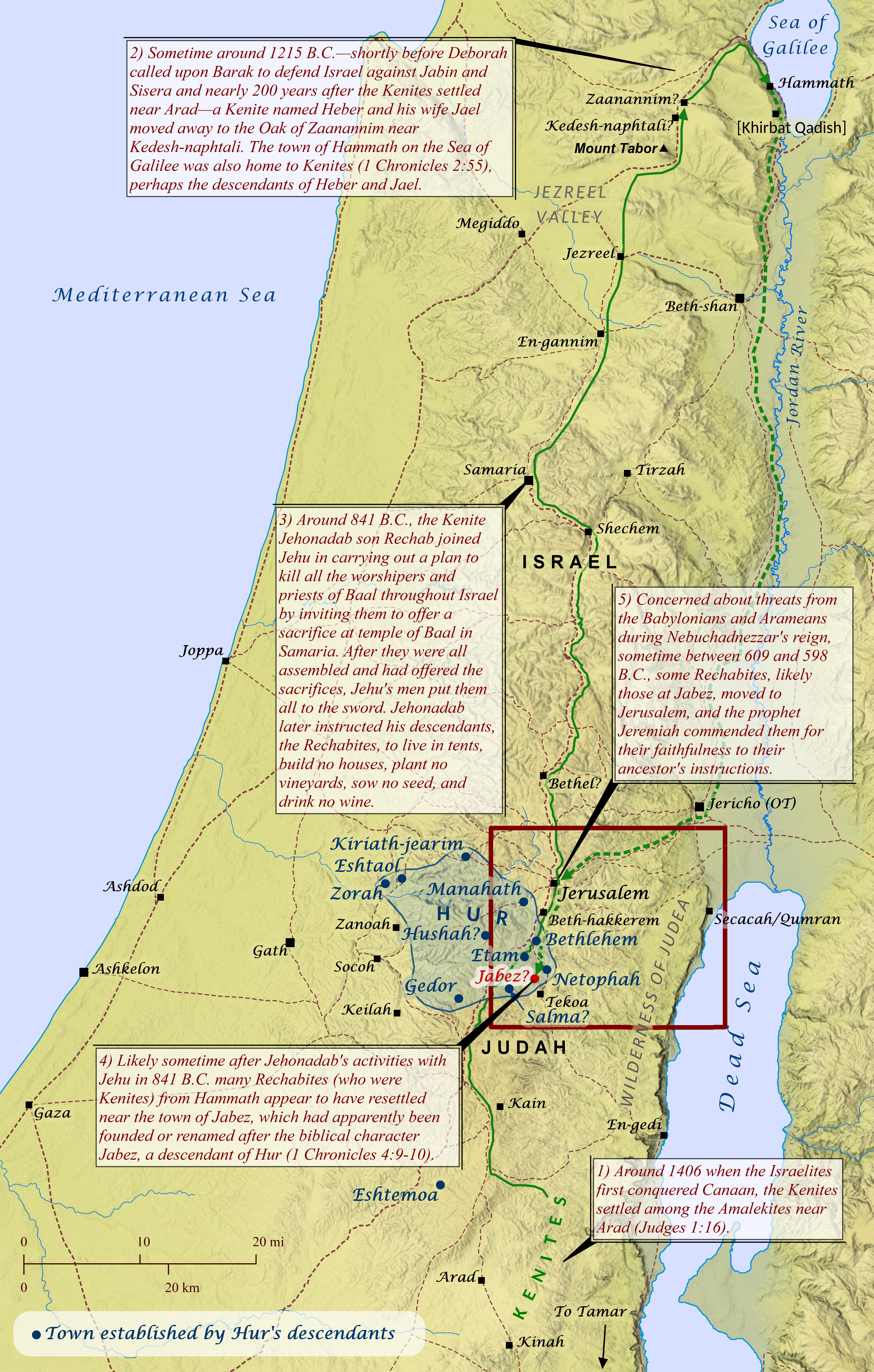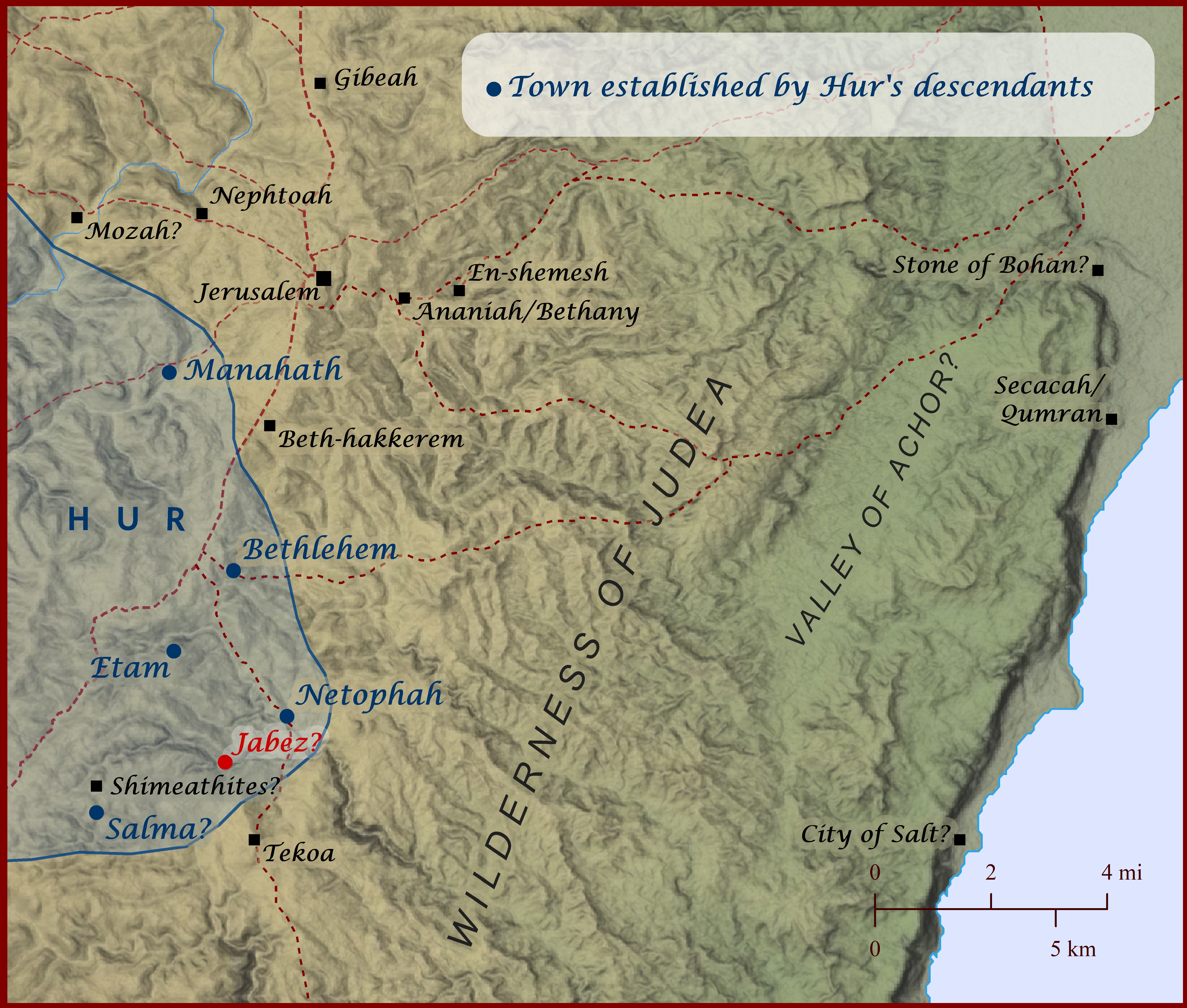Readers’ Version
Literal Version
2 Dān Yōşēf/(Joseph) and_Binyāmīn Naftālī Gād and_ʼĀshēr.
3 Yehudah’s sons (with the Canaanite woman Bat-Shua) were Er, and Onan, and Shelah. (Yehudah’s eldest son, Er, was evil in Yahweh’s eyes, and he killed him.) 4 His daughter-in-law Tamar had twin boys named Perets and Zerah, so altogether Yehudah had five sons.
5 Perets’s sons were Hetsron and Hamul. 6 Zerah had five sons: Zimri, Eytan, Heyman, Kalkol, and Dara. 7 Zimri had a son named Karmi. Karmi had a son named Akar who brought trouble into Yisrael by violating a ban on devoted things.[ref] 8 Eytan’s son was Azaryah.
4 and_Tāmār his/its_daughter-in-law she_bore for_him/it DOM Pereʦ and_DOM Zeraḩ all_of the_sons_of Yəhūdāh were_five.
5 the_sons_of Pereʦ were_Ḩeʦrōn and_Ḩāmūl.
6 and_the_sons of_Zeraḩ were_Zimrī and_ʼĒytān and_Hēymān and_Kalkol/(Calcol) and_Dāraˊ in_all_of_them were_five.
7 and_the_sons of_Karmī/(Carmi) were_ˊĀkār who_troubled Yisrāʼēl/(Israel) who he_acted_unfaithfully in/on/at/with_devoted_thing.
8 and_the_sons of_ʼĒytān were_ˊAzaryāh.
9 Hetsron had three sons: Yerahme’el, Ram, and Keluvay.[fn]
10 Ram was the father of Amminadav, and Amminadav was the father of Nahshon—a leader of the tribe of Yehudah. 11 Nahshon was the father of Salma. Salma was the father of Boaz. 12 Boaz was the father of Oved. Oved was the father of Yishay (Jesse). 13 Yishay had his son Eliav first, Abinadab second, Shimea third. 14 Netanel fourth, Raddai fifth, 15 Otsem sixth, then David last. 16 Their sisters were Tseruyah and Avigayil. Tseruyah’s three sons were Avshai, Yoav (Joab), and Asah’el. 17 Avigayil had Amasa. Amasa’s father was Yeter, a descendant of Yishmael (Ishmael).
10 And_Rām he_fathered DOM ˊAmminādāⱱ and_ˊAmminādāⱱ he_fathered DOM Naḩshōn the_leader_of the_descendants_of Yəhūdāh.
11 And_Naḩshōn he_fathered DOM Salmāʼ and_Salmāʼ he_fathered DOM Boˊaz.
12 And_Boˊaz he_fathered DOM ˊŌⱱēd and_ˊŌⱱēd he_fathered DOM Yishay/(Jesse).
13 And_Yishay he_fathered DOM his/its_firstborn DOM ʼElīʼāⱱ and_ʼAⱱīnādāⱱ the_second and_Shimˊāʼ the_third.
14 Nətanʼēl the_fourth Radday the_fifth.
15 ʼOʦem the_sixth Dāvid the_seventh.
16 And_sisters_of_their[fn] were_Tsərūyāh/(Zeruiah) and_ʼAⱱīgayil and_the_sons of_Tsərūyāh were_ʼAⱱshay and_Yōʼāⱱ/(Joab) and_ˊAsāh- ʼēl three.
17 And_ʼAⱱīgayil she_bore DOM ˊAmāsāʼ and_father_of ˊAmāsāʼ was_Yeter/(Jether) the_Yishmāˊʼēlī.
18 Hetsron’s third son Kalev (Caleb) had sons with Azuvah, one of his wives. The sons were Yesher, Shovav, and Ardon. (The other wife’s name was Yeriot.) 19 When Azuvah died, Kalev married Efrat, and they had a son named Hur. 20 Hur was the father of Uri, and Uri was the father of Betsal’el.
21 Later, when Hetsron was sixty years old, he had sexual intercourse with a daughter of Makir from the region of Gilead and married her. Hetsron’s new wife gave birth to their son Seguv. 22 Seguv was the father of Yair, and Yair controlled twenty-three cities in the Gilead region. 23 But Geshur and Aram captured Havvot-Yair and Kenat from them, plus their surrounding towns—sixty towns in all, populated by descendants of Makir (the father of Gilead). 24 After Hetsron’s death in Kalev-Efratah, his wife Aviyyah gave birth to his son Ashhur, the father of Tekoa.
19 And_ ˊAzūⱱāh _died and_he/it_took to_him/it Kālēⱱ DOM ʼEfrāt and_she/it_gave_birth to_him/it DOM Ḩūr.
20 And_Ḩūr he_fathered DOM ʼŪrī and_ʼŪrī he_fathered DOM Bəʦalʼēl.
21 and_after Ḩeʦrōn he_went into the_daughter_of Mākīr the_father_of Gilˊād and_he married_her and_he was_a_son_of sixty year[s] and_she/it_gave_birth to_him/it DOM Səgūⱱ.
22 And_Səgūⱱ he_fathered DOM Yāʼīr/(Jair) and_he/it_was to_him/it twenty and_three cities in_land the_Gilˊād.
23 And_ Gəshūr _he/it_took and_ʼArām DOM the_villages_of Yāʼīr from_among_them DOM Qənāt and_DOM villages_of_its sixty citi[es] all_of these were_the_sons_of Mākīr the_father_of Gilˊād.
24 And_after the_death_of Ḩeʦrōn in/on/at/with_Kālēⱱ- ʼefrātāh and_wife_of Ḩeʦrōn was_ʼAⱱiyyāh and_she/it_gave_birth to_him/it DOM Ashhur the_father_of Təqōˊī.
25 Hetsron’s oldest son was Yerahme’el and his sons were Ram (the oldest), Bunah, Oren, Otsem, and Ahiyyah. 26 Yerahme’el had another wife named Atarah. She was the mother of Onam. 27 The sons of Yerahme’el’s oldest son, Ram, were Maats, Yamin, and Eker. 28 Onam’s sons were Shammai and Yada, and Shammai’s sons were Nadav and Avishur.
29 Avishur’s wife was Avihayil, and their sons were Ahban and Molid. 30 Nadav’s sons were Seled and Appayim. (Seled died childless.) 31 Appayim’s son was Yishi, Yishi’s son was Sheshan, and Sheshan’s son was Ahlai.
32 The sons of Shammai’s brother Yada were Yeter and Yonatan. (Yeter died childless.) 33 Yonatan’s sons were Pelet and Zaza.
Those were the descendants of Yerahme’el.
34 Sheshan had no sons, only daughters. He had a male servant from Egypt whose name was Yarha, 35 and Sheshan gave his daughter to him for a wife, and they had a son Attai. 36 Attai was the father of Natan, and Natan was the father of Zavad. 37 Zavad was the father of Eflal, and Eflal was the father of Oved. 38 Oved was the father of Yehu, and Yehu was the father of Azaryah. 39 Azaryah was the father of Helets, and Helets was the father of Eleasah. 40 Eleasah was the father of Sismai, and Sismai was the father of Shallum. 41 Shallum was the father of Yekamyah, and Yekamyah was the father of Elishama.
26 And_ a_wife _it_became another to_Yəraḩməʼēl and_name_of_whose was_ˊAţārāh she was_the_mother_of ʼŌnām.
27 and_ the_sons_of _they_were of_Rām the_firstborn_of Yəraḩməʼēl Maˊaʦ and_Yāmīn/(Jamin) and_ˊĒqer.
28 And_ the_sons_of _they_were of_ʼŌnām Shammay and_Yādāˊ/(Jada) and_the_sons of_Shammay were_Nādāⱱ and_ʼAⱱīshūr.
29 And_name_of the_wife_of ʼAⱱīshūr was_ʼAⱱīhayil and_she/it_gave_birth to_him/it DOM ʼAḩⱱān and_DOM Mōlīd.
30 And_the_sons of_Nādāⱱ were_Şeled and_ʼAppayim and_ Şeled _he/it_died not sons.
31 and_the_sons of_ʼAppayim were_Yishˊī/(Ishi) and_the_sons of_Yishˊī were_Shēshān and_the_sons of_Shēshān were_ʼAḩlay.
32 And_the_sons of_Yādāˊ/(Jada) the_brother_of Shammay were_Yeter/(Jether) and_Yōnātān/(Yəhōnātān/(Jonathan)) and_ Yeter _he/it_died not sons.
33 and_the_sons of_Yōnātān were_Pelet and_Zāzāʼ these they_were the_sons_of Yəraḩməʼēl.
34 And_not it_belonged to_Shēshān sons if/because (if) daughters and_had_Shēshān a_slave from_Miʦrayim/(Miʦrayim/(Egypt)) and_his/its_name was_Yarḩāˊ/(Jarha).
35 And_ Shēshān _he/it_gave DOM daughter_of_his to_Yarḩāˊ/(Jarha) servant_of_his to/for_(a)_woman and_she/it_gave_birth to_him/it DOM ˊAttay.
36 And_ˊAttay he_fathered DOM Nātān and_Nātān he_fathered DOM Zāⱱād.
37 And_Zāⱱād he_fathered DOM ʼEflāl and_ʼEflāl he_fathered DOM ˊŌⱱēd.
38 And_ˊŌⱱēd he_fathered DOM Yēhūʼ/(Jehu) and_Yēhūʼ he_fathered DOM ˊAzaryāh.
39 And_ˊAzaryāh he_fathered DOM Ḩeleʦ and_Ḩeleʦ he_fathered DOM ʼElˊāsāh.
40 And_ʼElˊāsāh he_fathered DOM Sismai and_Sismai he_fathered DOM Shallūm.
41 And_Shallūm he_fathered DOM Yəqamyāh/(Jekamiah) and_Yəqamyāh/(Jekamiah) he_fathered DOM ʼElīshāˊma.
42 The oldest son of Yerahme’el’s brother Kalev was Meysha. Meysha was the father of Zif, and Zif was the father of Mareshah. Mareshah was the father of Hevron. 43 Hevron’s sons were Korah, Tappuah, Rekem, and Shema. 44 Shema was the father of Raham. Raham was the father of Yorkeam. Rekem was the father of Shammai. 45 Shammai’s son was Maon, and Maon was the father of Beyt-Tsur. 46 Kalev had a slave-wife named Eyfah who gave birth to Haran, Moza, and Gazez. Haran had a son who he also named Gazez. 47 Yahdai’s sons were: Regem, Yotam, Geshan, Pelet, Eyfah, and Shaaph.
48 Kalev had another slave-wife named Maacah who gave birth to Sheber and Tirhanah. 49 She also gave birth to Shaaph (the father of Madmannah), Sheva (father of Makbenah and Gibea), and Kalev’s daughter Aksah.
50 These people were also descendants of Kalev: His other wife Efratah had a son Hur. Hur’s sons were Shobal (founder of Kiriat-Yearim city), 51 Salma (founder of Beyt-Lehem), and Haref (founder of Beyt-Gader). 52 The descendants of Shobal (founder of Kiriat-Yearim) were Haroeh, half of the Manahatites, 53 and the clans from Kiriat-Yearim: the Yitrites, the Putites, the Shumatites, and the Mishraites. From those came the Zoratites and Eshtaolites. 54 Salma’s descendants were the people of Beyt-Lehem, the Netofatites, the clan of Atrot-Beyt-Yoav, and half of the Manahatites, who were also Zorites. 55 The clans of the scribes lived at Yabez: the Tiratites, the Shimeatites, and the Sucatites. These are the Kenites who descended from Hammat, the ancestor of Rekav’s family.
2:9 In the Hebrew, ‘Keluvay’ is called ‘Kalev’ (Caleb) below.
43 And_the_sons of_Ḩeⱱrōn were_Qoraḩ and_Tapūaḩ and_Reqem and_Shemaˊ.
44 And_Shemaˊ he_fathered DOM Raḩam the_father_of Yārəqəˊām/(Jorkeam) and_Reqem he_fathered DOM Shammay.
45 And_son_of Shammay was_Māˊōn and_Māˊōn was_the_father_of Bēyt Tsūr/(Tsūr).
46 And_ˊĒyfāh the_concubine_of Kālēⱱ she_bore DOM Ḩārān and_DOM Mōʦāʼ and_DOM Gāzēz and_Ḩārān he_fathered DOM Gāzēz.
47 and_the_sons of_Yehday/(Jahdai) were_Regem and_Yōtām/(Jotham) and_Gēyshān and_Peleţ and_ˊĒyfāh and_Shaˊaf.
48 The_concubine_of Kālēⱱ Maˊₐkāh he_bore Sheⱱer and Tirḩₐnāh.
49 And_she/it_gave_birth Shaˊaf the_father_of Madmannāh DOM Shəvāʼ the_father_of Makbēnāʼh and_father_of Giⱱˊāʼ and_daughter_of Kālēⱱ ˊAkşāh.
50 these the_descendants_of they_were of_Kālēⱱ the_son_of Ḩūr the_firstborn_of ʼEfrāt was_Shōⱱāl the_father_of Qiryat.
51 Salmāʼ the_father_of Bēyt- lehem Ḩārēf the_father_of Bēyt- Gādēr.
52 And_ sons _they_were of_Shōⱱāl the_father_of Qiryat Hāroʼēh[fn] (the)_half_of the_Mānaḩatites.
53 And_families_of Qiryat the_Yitrī/(Ithrite)s and_the_Pūtī and_the_Shumātī and_the_Mishrāˊī from_these they_came_forth the_Tsārəˊī/(Zorathites) and_the_Eshtaolites.
54 the_sons_of Salmāʼ were_Bēyt- lehem and_Nəţofātī ˊAţrōt_Bēyt- Yōʼāⱱ/(Joab) ˊAţrōt_Bēyt- and_half_of the_Mānaḩatites the_Tsārəˊī/(Zorites).
55 And_families_of the_Sophrites who_were_dwelling_of[fn] of_Yaˊbēʦ/(Jabez) were_the_Tirˊātī the_Shimˊāʼthites the_Sūkātī they the_Qēynīs the_(ones_who)_went from_Ḩammat the_father_of Bēyt_of Rēkāⱱ.


